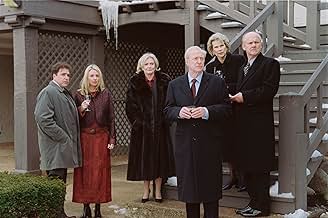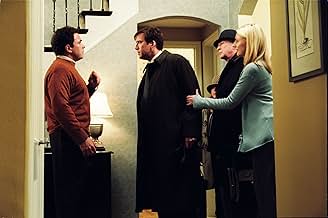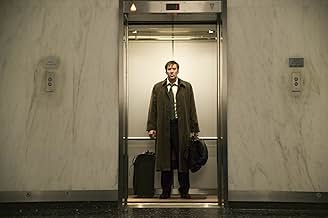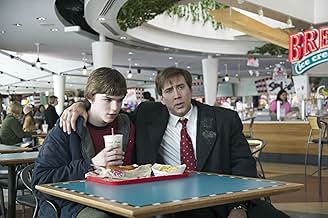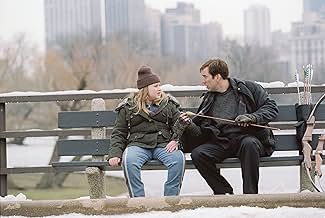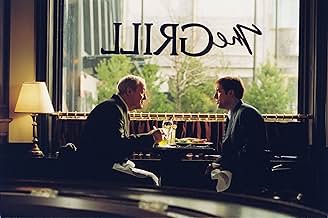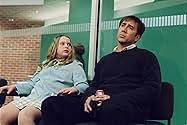Um meteorologista separado de sua esposa e filhos, debate se o sucesso profissional e pessoal são mutuamente exclusivos.Um meteorologista separado de sua esposa e filhos, debate se o sucesso profissional e pessoal são mutuamente exclusivos.Um meteorologista separado de sua esposa e filhos, debate se o sucesso profissional e pessoal são mutuamente exclusivos.
- Shelly
- (as Gemmenne De La Peña)
- Clerk
- (as Deanna NJ Brooks)
- Nurse
- (as Sia Moody)
- Fast Food Employee
- (as Alejandro Pina)
Avaliações em destaque
So the story begins...Dave Spritz is a Chicago weatherman. As the events of his life get worse he begins to put all his faith in a dream job in New York as a national weatherman. He believes this job will magically restore his failing marriage, his relationship with this kids and garner him the respect from his father (Michael Caine)he so desires.
The ability to find humor in life's tragedies is an accomplishment that director, writer and cast can all be proud of. The comedy in this movie came just often enough to hold back the tears. It was a real life character study and of course Nicholas Cage and Michael Caine were absolutely superb.
What makes the movie so wonderful is that it is based on premises we all know but often forget. 1)Money doesn't buy happiness. 2)The little things mean a lot. 3)To quote the film, "The hard thing to do and the right thing to do are usually the same thing."
Nicolas Cage takes the lead role, and while he's never really stretched; he manages to give a fine performance throughout the film. In support, we've got the likes of Michael Caine and Hope Davis, as well as talented youngster Gemmenne de la Peña, who all round the acting off nicely. The film manages to pull together two very different tones and make it work. There's some rather funny humour on display, and this is mixed with an overall pessimistic mindset. This gives The Weather Man something of an original standpoint, and although it has to be said that the plot itself is never overly interesting, the tone of the movie is good enough to see it through. From mainstream cinema; especially American mainstream cinema, you don't expect to see films with such a depressing viewpoint on life - but it really doesn't get much more depressing than the one professed here. Verbinski's film states that, like the weather, life cannot be predicted - and no matter what hopes and dreams you have, they're likely to be smashed by the time it comes to realising them. Ouch.
A job as a weatherman, without a meteorological degree entails absolutely no challenges. You become lazy and bored, because you think you have everything. After all, isn't the entire purpose of life to make money, drive nice cars, and wear nice clothes, and eat out every night of the week? You are able to spoil your children, hence never teaching them the value of challenging themselves and depriving them of ever working toward a goal and feeling satisfied.
This is what we think living is today in this country! We have no depth! We have toxic vocabulary, eat useless toxic food, we watch useless toxic entertainment, and we have completely useless jobs that create nothing. We wonder why our children have no idea what to do with themselves? Wealthy Americans, which most of us are by the standards of the world, have no skills, no integrity, and no character. The only things our children grow up knowing for sure, are what a Frosty is, and a Big Gulp. The gap between this generation and their grandparents is vast. Our elders worked hard at jobs which created the foundation of wealth and substance that we erode every day with our irresponsible selfish consumerist conduct. Mr. Spritz has no idea what a Big Gulp is, but he's dying of the cancer that eats this country.
The Weatherman (Nicholas Cage) has a better time with himself, and everyone else as soon as he figures this out. Hilariously, he had to actually get hit in the head with a Big Gulp. We need to focus on the things that matter, take responsibility for our children, and ourselves. The one thing that I think was off in the movie was the line about how being an adult does not include the word easy. The big secret to life, is that when we do things the correct way, often the hard way, life actually gets easier, for everyone.
I went to the theater expecting the usual vacuous Hollywood bomb. I was blown away with the power of this movie. On the way out, we asked a young man that was working the theater what he thought. He said that he thought The Weatherman was incredibly dark and very far fetched. I agree, our culture is dark and far fetched. The movie, however, was dead on. Our current life is a bubble about to burst. This movie offered a solution - find some meaning in your life and get after it. Pretending this vacuum doesn't exist, and that Jessica and Ashley Simpson are talented individuals worth our time and interest, is incredibly bleak to me. On the other hand, I was pretty sure this young man had no idea the scale of these problems. How could he, when he has never experienced anything else.
Nicolas Cage, who I don't always like, gives a fantastic performance as David Spritz, a Chicago TV weather man with no degree in meteorology. The thing that makes him great in The Weather Man is that he consistently plays the part in earnest. There's plenty of opportunities to ham it up or play it for laughs, especially because David acts like such an asshole so much of the time, but Cage never falls into those traps. One feels at every turn, no matter how disgraceful his behavior, that he's just a guy trying to do what seems right to him in that moment. At one point he drops his daughter off at his ex-wife's house. When his ex-wife, played with terrific subtly by Hope Davis, remains outside for a moment he suddenly decides to throw a snowball at her, which hits her in the face and cracks the lens of her glasses. Rather than playing it like it's funny, which it is, Cage seems like he's making a sincere attempt to connect with his former wife in any way he can.
I wish with great passion that this film was truly great, but unfortunately it's just inches short. Nine out of ten times Verbinski hits the mark. From the very first shot he creates a perfectly executed world of an ice bound Chicago during the winter months. His most impressive feat though is managing to craft a film that is in some ways highly stylized, yet instinctually feels like the human experience. He has a wonderful and surprising sense of composition. One finds the characters in disconcertingly angular frames with vast expanses of empty space above their heads. In tandem with this he uses a fantastically chilly color scheme throughout. He also triumphs in his insistently measured pacing. In contrast with such a harsh statement about life, the pacing serves to lend the film a strange gentleness that allows for us to feel the characters are truly human. The pacing is absolutely vital and absolutely brave in a Hollywood film. Along with the performances, it makes one feel that the characters are being not being tortured out of gleeful spite on the part of the filmmakers, but out of profound empathy and understanding of our shared human weaknesses.
Verbinski's trouble comes in just a few isolated areas; nevertheless they are important and significantly damage the film as a whole. The ugliest problem is a woefully ill-advised quasi dream sequence in which Nicholas Cage sees himself happy and well adjusted as the grand marshal of a parade. The whole thing is presented as if his hotel room window is like a TV on which he is seeing himself. It introduces us to no useful ideas and is an immensely distracting stylistic departure. I'm really puzzled by its inclusion in a movie that on the whole demonstrates a lot of restraint. Another issue is the handling of Cage's son, who gets himself involved in a weird molestation situation with his drug counselor. This subplot is painted in the broadest of strokes, rather than with the painstaking specificity one finds elsewhere. Every time we return to the plot with the son the film begins to feel bogged down and uncharacteristically unsure of itself. Some of the blame for this surely must be shared with Steve Conrad, the mostly solid writer of the film. One wonders why Conrad and Verbinski shy away from the unbending frankness they are generally so willing to dole out. There are a few other troubling mistakes, the blame for which I have to rest on both of their shoulders. Most notably the film relies too heavily on voice-over. While some of it works very well and all of it is delivered with sincerity from Cage, there is at least twice as much as is necessary. Similarly, there are a couple flashbacks that work, but just as many that are unneeded. Also, the handling of Cage's father, who is played with solemn dignity by Michael Cane, rings a little false. He is written as a noble and stalwart man devoid of any flaws not only in Cage's mind, but apparently in real life as well. On the whole this actually works much better than it should, but I can't help but feel that there's a note missing.
The aforementioned issues aside, The Weather Man is a rare achievement and one of my favorite films of the year. It is so honest and so bleak that I can't believe that a major studio let it get made. In an industry where schlock and melodrama are passed off as great statements about us as humans The Weather Man is monumentally refreshing. I have nothing but respect for Verbinski and Conrad for having the nerve to make a film that on the one hand is crushingly negative, but on the other endlessly humane.
David Spritz is a man whose life has become the ultimate exercise in futility. Each day, he wakes up and goes to a job that, despite paying a handsome salary, is entirely unfulfilling. His relationship with his ex-wife is strained, his relationship with his children distant. To make things worse, his Pulitzer Prize winning father seems to be disappointed in what David has done with his life.
In real life, progress in one's personal life is generally made in baby steps. Usually, people don't undergo a drastic transformation over the course of several months. David attempts to improve his standing in life, at times failing entirely, at times succeeding in small doses. The results of these attempts range from very funny to downright saddening, and this helps lend the film an air of realism. This is a complicated character study about a man coming to grips with the fact that he's failed to meet any of the goals he set for himself in life, despite attaining a social standing that many people are envious of. There aren't any easy answers or life altering epiphanies; self-improvement is a long, gradual task that will probably never be completely fulfilled, and "The Weather Man" reflects this reality. While not for all tastes, this movie deserves credit for tackling a relatively conventional subject in a very unconventional, at least for a mainstream Hollywood movie, manner. I imagine that this film will be a bigger success overseas and on DVD than it will be in its US theatrical run.
Você sabia?
- CuriosidadesThe "plastic" spoon stuck to Nicolas Cage's lapel was actually a metal spoon that had been painted to appear plastic and which was held in place with a magnet.
- Erros de gravaçãoWhen David enters the bathroom and rinses, the mirror reveals that his watch is undone and hanging around his wrist. In the next shot, from a different angle, his watch is done up.
- Citações
Dave Spritz: I remember once imagining what my life would be like, what I'd be like. I pictured having all these qualities, strong positive qualities that people could pick up on from across the room. But as time passed, few ever became any qualities that I actually had. And all the possibilities I faced and the sorts of people I could be, all of them got reduced every year to fewer and fewer. Until finally they got reduced to one, to who I am. And that's who I am, the weather man.
- ConexõesFeatured in Atmospheric Pressure: The Style and Palette (2006)
- Trilhas sonorasThe Passenger
(1977)
Written by Iggy Pop & Ricky Gardiner
Performed by Iggy Pop
Courtesy of Virgin Records
Under license from EMI Film & Television Music
Principais escolhas
- How long is The Weather Man?Fornecido pela Alexa
Detalhes
- Data de lançamento
- Países de origem
- Idioma
- Também conhecido como
- El sol de cada mañana
- Locações de filme
- Empresas de produção
- Consulte mais créditos da empresa na IMDbPro
Bilheteria
- Orçamento
- US$ 22.000.000 (estimativa)
- Faturamento bruto nos EUA e Canadá
- US$ 12.482.775
- Fim de semana de estreia nos EUA e Canadá
- US$ 4.248.465
- 30 de out. de 2005
- Faturamento bruto mundial
- US$ 19.126.398
- Tempo de duração1 hora 42 minutos
- Cor
- Mixagem de som
- Proporção
- 1.85 : 1
Contribua para esta página





